No two people feel the exact same way about any film. Thus, Team Experience is pairing up to debate the merits of this year’s Oscar movies. Here's Nathaniel Rogers and Cláudio Alves on Maestro...
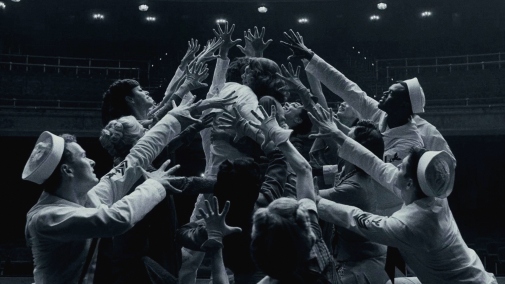
NATHANIEL: Being on the defensive about a movie you love is always confusing. The internet has been throwing darts at Bradley Cooper's compelling and curious Maestro for months now and I will say that I'm glad to not be 'perpetually online' as I once was. For the most part I've been able to enjoy Maestro in piece. Until now in the "split decision" series. Haha. I first saw Maestro at the Paris Theater which is a famous old single-screen theater in Manhattan (the last of its kind here!) and located roughly in between Bernstein's two main NYC residences (The Dakota to the west and Park Avenue to the East). The theater was packed with older folks who knew who Leonard Bernstein was. I went with a group of friends who were visiting for Thanksgiving, two of whom are classical music-obsessed. It was the ideal venue and situation in which to see a flamboyant handsome old-school biopic about a 20th century giant who I was already an enormous fan of. I consider West Side Story the greatest musical ever written and Candide, Wonderful Town, and On the Town, all hold distinct pleasant memories for me from multiple periods in my life as a musical theater aficionado.
I bring this up because personal history and context of the moviegoing experience totally affects people's opinions on movies whether they'll admit to it or not. So, before this conversation I watched the first half of Maestro again as a refresher to make sure I wasn't overly influenced by that very memorable happy first viewing. I still love it on second viewing at home in a far less ideal setting…
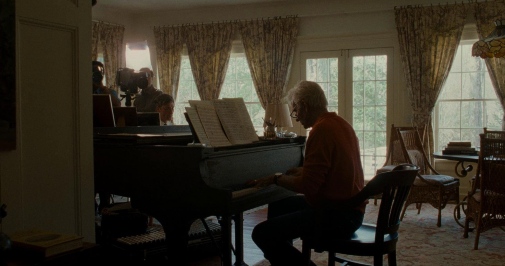
I want to start with the opening gambit. The movie begins with a brief color sequence of Bernstein as an old man tinkering on the piano and talking about his wife to reporters before flashing back to a black and white sequence of Bernstein getting the rightly legendary phone call that changed his life. When he hangs up he opens the curtains to the bedroom and the light pours in revealing a naked man (Matt Bomer). Lenny bounces up and down on the bed and plays the drums on Bomer's bum before sprinting into the next sequence: the concert that changed his life overnight. Only we skip the concert itself. I love everything about this opening which immediately presents the contradictions of Bernstein's life but also the picture's form itself (married/gay... old/young... color/black and white... musical genius / who didn't write that much music). The editing feels robustly musical and the cinematography as showy as this iconic subject deserves. Let's just say I felt the rush and adrenaline of a hyper-speed rise to fame and I was immediately on the movie's side.
But somewhere along the line it lost you or we wouldn't be paired for this conversation.
CLÁUDIO: Since you shared your first time seeing Maestro, it's only fitting that I share mine. Unlike you, I didn't get to see it with friends, but at a critics screening in Lisbon before a small theatrical run served as prologue to its Netflix release. This was at the end of November, before the internet got its claws on Cooper's opus and tore it to shreds. Indeed, going in, my expectations were sky high, my mind still reeling from the ecstatic reactions following its NYFF screenings and the enthusiasm of people I follow like yourself. As someone who liked Cooper's A Star Is Born, I felt primed to have a good time but, instead, found myself witnessing one of the year's most frustrating films. Sure, I can recognize many qualities within the thing, but the general experience of Maestro was not for me.
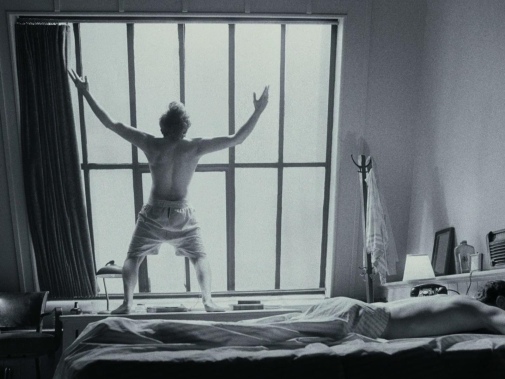
I do love and respect your admiration and all the beautiful contradictions you found within its opening salvo. The interview framing felt clichéd on a first watch, and the vagueness of Bernstein's answer now strikes me as a presage, warning of the nebulous characterization ahead. Jumping from that to the concert that changed everything is an exciting touch, as is the denial of that glorious moment. However, I struggle to see what it accomplished beyond a stylistic flourish. It certainly keeps the viewer at a distance from Bernstein's process and his relationship with his art. As often happens throughout the narrative, his specificity as an artist is out of reach, hidden behind a wall of ruminations on legacy and a certain self-regard. It makes sense coming straight from the interview setting, its invitation to solipsism and evasion. But intellectual coherence doesn't necessarily make good or engaging cinema.
Trying to find some silver linings in this opening, I can say that the black-and-white half is the best that Maestro has to offer, in part because Cooper allows himself to go a bit zany behind the camera. He's said some dumb things in interviews about those stylistic choices, but I want to believe he's just bad at explaining himself. Also, the bongo butt is delightful, providing playfulness and a sense of eros the ensuing picture sorely lacks.
NATHANIEL: At least we agree about the bongo butt! I agree that the movie could have used more of the eros you mention -- particularly in the second half (which, like A Star is Born, is weaker... someone needs to help Cooper with his second acts!). But I want to praise the scene in bed with Felicia (Carey Mulligan) when Lenny is struggling with his back -- it has a similarly playful sexuality and feels so intimate and unexpected, too. I've heard a lot of complaints about the way Bernstein's sexuality is presented given that the narrative is squarely focused on his marriage (so much so that the gay relationships do play more like standard infidelity drama). But that said I think people are overstating the picture's simplicity in this regard.
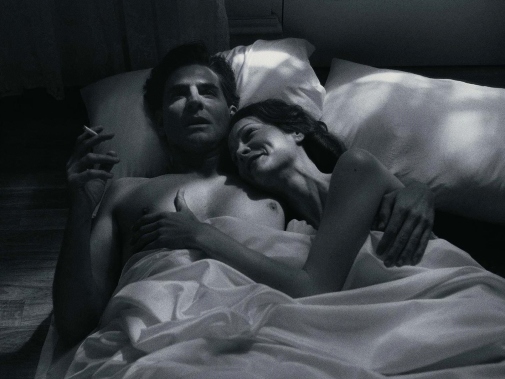
There are interesting curlicues about sexual identity and sexual behavior in this movie from Felicia's monologue at lunch (Carey Mulligan earned that Best Actress nomination, sorry haters!) when she's coming to grips with her own needs and foolish assumptions that she was somehow above it all in this regard. One of my very favourite scenes is a short tossed off bit where Lenny meets his ex (Bomer) and the ex's new wife. I adored the largesse with which Bradley Cooper attacks that scene, telling their infant he'd slept with both of the parents, followed by the comic supressed roar of "I'm reigning it in!"
Later Lenny's painful falsity when he's talking to his daughter about the "rumors" around his sexuality -- this isn't new territory of course but I do think contemporary audiences have a really hard time (especially in the past ten years ...for cultural shift reasons) with accepting that period pieces SHOULD display and reflect the mores and feelings of their time, however uncomfortable those are for the "enlightened" present. 30 years from now people will be horrified by the way people in the 2020s behaved and thought, you know?
Anyway, I digress.
I readily admit that interview framing is hardly "fresh" -- it's been used in countless films both great and terrible. You have a point about the lack of specificity around Bernstein's art, but I think that's one of the most interesting things about the picture because I'd argue that Maestro knows this about itself. Most artist biopics are pretty bad at getting specific about the art that made the person famous (they almost always focus on personal relationships or "struggles" of some sort) but at least this one is smart enough to key into Bernstein's own trouble with defining his gift or himself. I think the scene where he complains that he hasn't produced that much art is great. People wanted to box him into one thing or another at various times but his talent was diffuse and avoided restrictive labels like Conductor or Musical Theater Composer or Composer or Teacher.
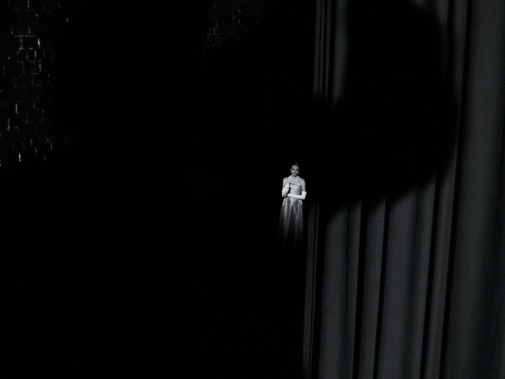
It's obvious to me in the movie's commitments and passion that Bernstein's work and life really resonate with Cooper. I dont want to speculate on Bradley Cooper's sexuality (I'll leave that to other corners of the internet) but even if you only look at Bernstein's relationship to art, Cooper shares that multi-hyphenate restlessness about him. He produces. He acts. He directs. He writes. He composes music. I think this comes through loud and clear in the movie.
CLÁUDIO: Since I'm about to go extremely negative, let me just say I adore that moment with the baby at the park. I'm not joking when I say it should be Cooper's Oscar clip – such wonderful theatricality, a man high on his own supply of charisma and success, practically floating through the screen. It's also the last place where the protagonist's desire is seen as anything but a constant source of misery for everyone involved.
I'm one of those people who thinks the film's treatment of Bernstein's sexuality is quite dismal, and I won't mince words about it. However, I do need to clarify that my irritation with the movie isn't a criticism of the behaviors depicted in it. These historical characters' views toward the issue feel authentic, and I wouldn't want Maestro to put forward a vision of midcentury America through rose-colored glasses. I am, however, against how the film approaches and weaponizes this topic, how it frames this facet of Bernstein's life regardless of Felicia's monologue.
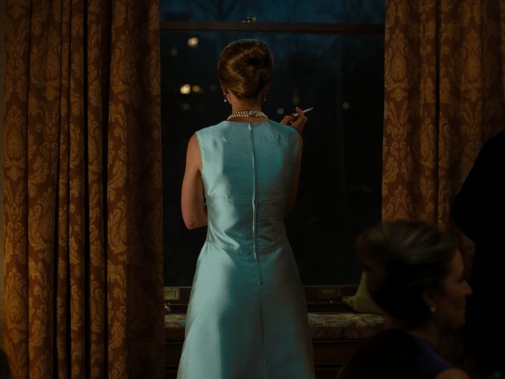
From the moment the narrative switches to color, until the cancer diagnosis, almost every cut in a 40-minute stretch creates a tragedy out of Bernstein's same-sex attraction and philandering ways. His lovers are non-entities, flattened into signifiers of emotional turmoil for Mulligan to react to in portentous close-ups or biting dialogue. Gideon Glick as Tommy Cothran is an albatross rather than a character. He starts with an illicit kiss and becomes a nuisance during rehearsals, an intruder into the Bernstein family home, a hand-clasping violation of Felicia's dignity when Mass premieres. It culminates in his last appearance, a sweaty hedonist doing coke with Lenny after he's become estranged from his wife. Of course, the sequence ends with Cooper on a weepy phone call, articulating how lost Bernstein is without his spouse. It's left implicit how unfulfilling following his erotic desires has been.
It's possible to portray a queer man conflicted about his queerness without making that side of his life into a black hole. And I guess you can argue that the film is strictly about Lenny and Felicia, so no other character gets to be a character. Their expansive social circle is but a mirage of famous names and cameos.
But then, why is Felicia so unspecific herself? Beyond her role as a wife to the great man, the real woman's life is a conspicuous nothing. Felicia Montealegre was an actress at the forefront of 1950s New York theater and its expansion to TV, one of those pioneer thespians who started to bring new notions of drama to a broader American audience. She was also an activist engaged with some of the social schisms of her time. If you believe Maestro, you would think she was a debutante thespian of dismissible talent who did little other than being a housewife. There's a vague gesture toward professional and artistic sacrifices, but it's impossible to get a sense of that personal cost because the film has done such a lousy job sketching her as anything other than her husband's other half. If Cooper wanted to honor Felicia, even making Mulligan first-billed, he did her a disservice, reducing the woman to a footnote in Lenny's history even more than she already was.
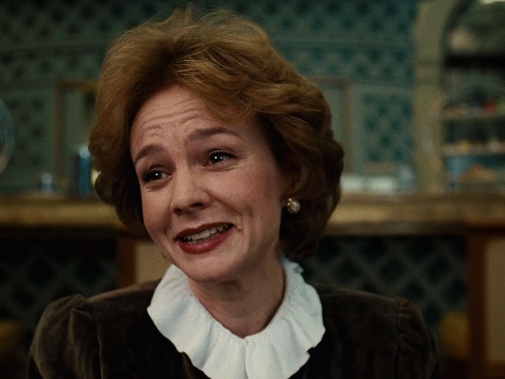
A film can't encompass everything, but surely it can do more than this.
NATHANIEL: I understand your reservations as you've articulated them well, but I just don't really share them apart from readily agreeing that the second color half is weaker. [Total aside: Though I love the cinematography in Maestro in both halves I am otherwise actually pretty sick of the current ubiquity of black and white AND color gimmick. Just choose!] Still, I do think you have to choose what to focus on in a narrative and the choice here is absolutely the marriage. For me, it was a riveting depiction of a complicated union that fed some of Bernstein's soul but not enough of it. I don't think the take on Felicia's professional and artistic sacrifices is "vague" at all, even if her career is. These sacrifices are illuminated beautifully by Carey Mulligan's work. And I don't think it's the movies job to educate people on her career; it's not a Felicia Montealegre biopic. The focus here is squarely on being a marriage portrait and even the most towering moments of Bernstein's career are out of frame rather than spotlit. I'll grant you that that is not going to work for anyone who wanted a portrait of the art itself. (This movie did not fill my enormous need for a whole movie about the making of West Side Story which would be a masterpiece in the right hands, given all the legendary characters who had a hand in it and it's mythic place/time in culture).
I agree that the supporting characters could have used a bit more illumination -- though I think Sarah Silverman ate as Shirley Bernstein -- but this is a common feature/bug of movies about relationships (I remember it driving a lot of people mad about La La Land and I remember it driving me absolutely mad about Paul Thomas Anderon's The Master which I desperately felt needed more context of a peculiar rarefied world). Sorry, that might be too much of a leap to a broader topic! My point is that people only seem to mind vague peripheries if they're not wholly caught up in the center, which you obviously weren't here. And I do freely admit I was filling in a lot of gaps as someone who loves Bernstein's work and knew who some (if not all) of the supporting characters were. Cooper probably shouldn't have assumed that today's audiences would be as familiiar with Bernstein's work as he is. Since I brought up other movies and common genre bugs, I should add that I wish pretty much every filmmaker would study Altman and realize how much you can say about dozens of side characters without giving the narrative over to them.
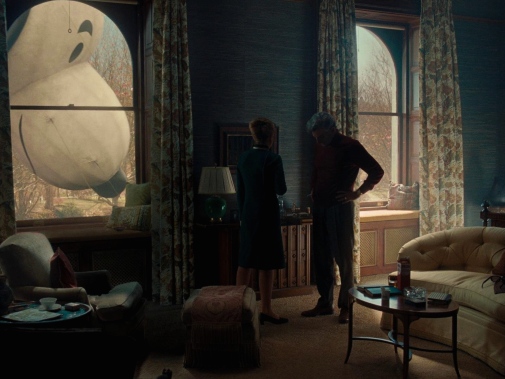
But bringing it back to "focus" I will say that as a marital drama, Maestro completely worked for me. I lived for the Thanksgiving Day Parade punchline to a bruising marital fight. I love when movies play with punctuation, or, in this case puncturing a scene, pulling a rug out from under what you're feeling.
CLÁUDIO: The Thanksgiving argument is the best part of the picture's second half, and I appreciated its mix of humor and plain nastiness. Most of the dialogue gestures at notions of Bernstein's artistic struggles, but, in the moment, it reads like an angry woman's deflections. She's using those words because she knows they'll hurt her target. The Snoopies - one abandoned in the vestibule, the other a giant balloon – are fantastic contrasts. Moreover, there's a powerful disruption (or puncturing) in how Cooper lets us appreciate Felicia's thorniness without sanding down her rough edges. For an instant, there's no heavy hand to coax us into sympathy and cheap sentiment.
But then, it's like the script can't help itself, transforming the angry accusations into supposed insight to propel its cathedral reconciliation (I have so many issues with that scene). Felicia's potential as a spiky presence gets thrown out the window almost as soon as it manifests, and all we have is that paltry monologue you obviously like better than I do.
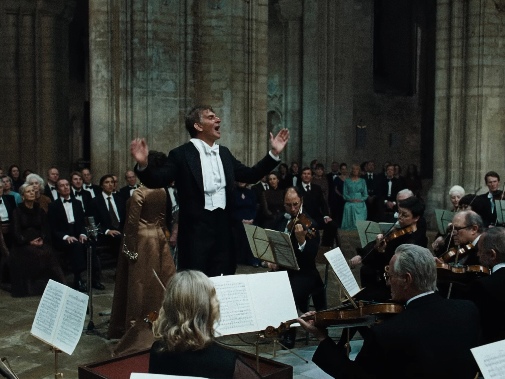
So much of my experience with Maestro is a glimpse of greatness within more significant failures, missed opportunities galore. You mention the cinematography, and I agree it's beautiful work from Matthew Libatique, as is the design team's recreation of the historical past. At the same time, I think Cooper jeopardizes those wonders with bad directorial decisions. For example, the shift to color doesn't work, and the myopic focus on the marriage at both script and visual levels unmoors the central figures from their context, even in material terms. Sometimes, I wonder if the picture would have worked better if it had picked one register and focused on the period lost in its time jump. The 60s and the gradual dereliction of the characters' union might have been more interesting than what we get.
If one's not interested in the Bernstein couple's relationship to their art, their times, their social circle, why make the movie about them in the first place? You mention The Master, and that got me thinking about the PTA approach and Todd Haynes' many post-Superstar stabs at "real stories." As different as they are, those films only want to connect to reality up to a certain point. They have dramaturgical priorities divorced from direct engagement with historical specificities, so they use fictionalization instead. I feel like I'd have been more generous toward Maestro had it been brave enough to go down that path.
But of course, that would have meant losing biopic prestige and the music tied to the Bernstein name. Not sure I could tolerate Maestro without the music.
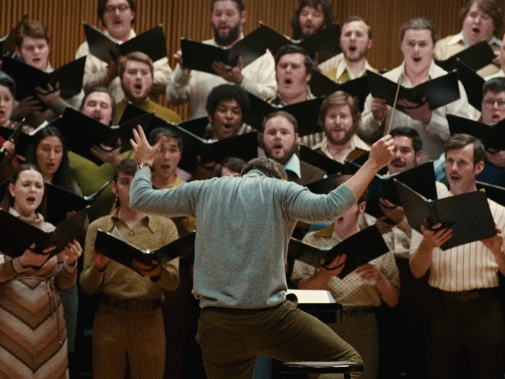
NATHANIEL: Why would you? For there is no Maestro without that glorious music. I don't agree that the shift to color doesn't work -- it's not "inspired" but neither is it arbitrary or pretentious. It's just a visual shift to accompany a temporal one. So this feels like nitpicking, honestly. Which happens when people hate movies! I get it. I've done it too. Regarding the music, I was about to mention that I very much enjoyed Maestro's unintentional relationship to TÁR but then remembered that you're not a fan of that one either! Do you have something against classical music, Cláudio? I kid I kid. Nevertheless, it's interesting (to me) that we've had two artistically ambitious prestige "biographies" about great conductors in two subsequent years, one fictionalized and partially inspired by Bernstein and one about Bernstein. There's something in the air!
As for whether or not focusing on one period would have worked better, I'd agree that it would have. Most of the best biopics are laser focused on either one theme or one time frame. Maestro doesn't do enough for you but it did plenty for me and I actually wish it had done a little less if that makes sense. I appreciate that for all of Cooper's obvious ambitions as a director, the movie isn't trying to do everything.
We will obviously never see eye to eye on this particular picture. I respect that you're not doing what I'm about to complain about - you have clearly thought out and artistically sound objections to the picture -- but it's honestly disheartening and frankly small-minded that so many people (online and presumably otherwise) want to keep artists (not just Cooper) in tiny boxes and reacted so vitriolically when they try to climb out and explore or appear to be a "try hard.” So, here's to trying hard and exploring! For the sake of the few qualities we do agree on in regards to Cooper's second directorial effort, I will say that I hope that Bradley Cooper keeps challenging himself as a multi-hyphenate, keeps including a musical element (music obviously speaks to him), keeps working with wonderful artisans below the line, and ignores the haters
... but asks for help on his second acts!
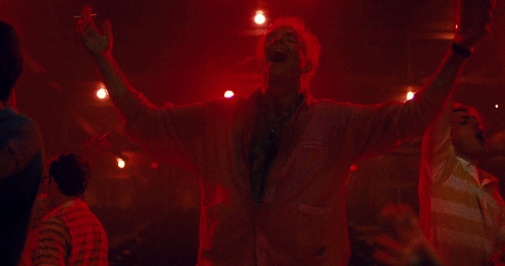
CLÁUDIO: The fact that the shift to color coincides with the taming of Cooper behind the camera sours the whole thing for me. But to your point, I admire the star's willingness to challenge himself and hope he continues to do so. Fingers crossed, he hones on Maestro's qualities and indulges in the wild swings he showcases in its first half. Hell, make a classic musical already.
It's funny that you mention TÁR since, while I had issues with that flick, I was still into it as a whole. Furthermore, watching Maestro made me re-appreciate what Todd Field was up to and discover a new respect for what worked there but didn't in Cooper's vision. I promise I can love movies about classical music – Amadeus, the work of Visconti and Ken Russell, Powell & Pressburger, and even Haneke's merciless stabs into the subject.
Finally, I agree that the online vitriol against Maestro has exploded beyond reasonable measure. Even as a hater, I can find plenty to respect about the project and wouldn't mind it getting the Best Actor Oscar. I'm rooting for Wright in the lineup, but could live with a Cooper crowning. Mahler aside, it's a good performance, drunk on the possibilities of biopic mimicry but not too entrapped by it. If nothing else, it exudes earnest passion – but please, contain that earnestness in interviews. We're reaching some concerning levels of oversharing, Mr. Cooper!
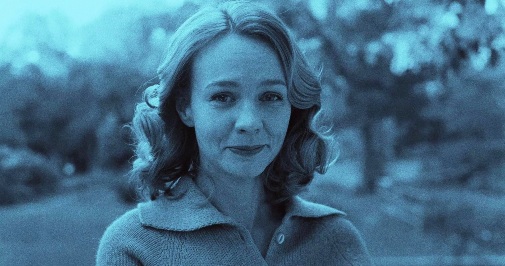
Previous Split Decisions: